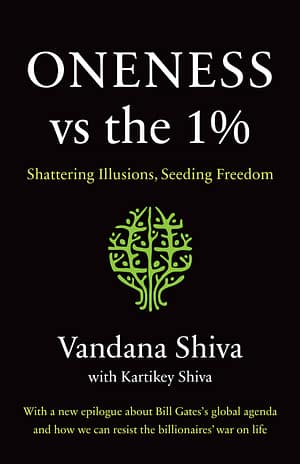Seeding the Future

Widespread poverty and malnutrition, an alarming refugee crisis, social unrest, and economic polarization have become our lived reality as the top 1% of the world’s seven-billion-plus population pushes the planet—and all its people—to the social and ecological brink.
In Oneness vs. the 1%, Vandana Shiva takes on the Billionaires Club of Gates, Buffet, and Zuckerberg, as well as other modern empires whose blindness to the rights of people, and to the destructive impact of their construct of linear progress, have wrought havoc across the world.
Basing her analysis on explosive, little-known facts, Shiva exposes the 1%’s model of philanthrocapitalism, which is about deploying unaccountable money to bypass democratic structures, derail diversity, and impose totalitarian ideas based on One Science, One Agriculture, and One History.
She calls for the “resurgence of real knowledge, real intelligence, real wealth, real work, real well-being,” so that people can reclaim their right to: Live Free. Think Free. Breathe Free. Eat Free.
The following is an excerpt from Oneness vs. the 1% by Vandana Shiva and Kartikey Shiva. It has been adapted for the web.
Seeding the Future
Seeding the future when possible extinction stares us in the face, seeding freedom when all freedoms of all beings are being closed for the limitless freedom of the 1% to exploit the earth and people, to manipulate life and our minds, calls for a quantum leap in our imaginations, our intelligences, our capacity for compassion and love, as well as our courage for creative nonviolent resistance and non-cooperation with a system that is driving us to extinction.

There is a third option beyond extinction and escape, the alternative of rejuvenating the earth to be able to continue to live here, in the particular places and the planet we call home. This is our evolutionary challenge. If we awaken to our own intelligence and evolutionary potential, and the intelligence pervading our planet and the universe we do not need to slip into the despair and hopelessness of inevitable extinction, or the hubris of conquest and mastery over other planets.
Elon Musk wants to create a Space X city on Mars: ‘By talking about the Space X Mars architecture, I want to make Mars seem possible—make it seem as though it is something that we can do in our lifetime,’ he writes, adding, ‘There really is a way that anyone could go if they wanted to.’ Musk believes the threshold for a self-sustaining city on Mars would be one million people. Current calculations indicate that it would take between 40 to 100 years ‘to achieve a fully self-sustaining civilization on Mars.11
In less than the one hundred years that the masters of the universe would like one-eighth of the human population to climb into a spaceship and escape to Mars (there is, of course, no mention of the rest of humanity and the rest of species) humanity could regenerate the planet, rejuvenate the earth’s soils, water, biodiversity, bring about a balance between humans, and provide enough food for all.
For Musk, as for Hawking, there are only two fundamental paths for mankind—that we stay on earth forever, eventually succumbing to an extinction event, or to become a ‘space bearing-civilization and a multi-planetary species’. Musk, like How the 1% Subverts Democracy all men suffering from technological hubris, does not seem to understand that being a planetary citizen does not need space travel. It means being concious that we are part of the universe and the earth, and that we need to live in accordance with the laws of the universe, of the earth. The most fundamental law is to recognise that we share the planet with other beings, and that we have a duty to care for our common home.

Both Hawking and Musk seem to have ignored the fact that the earth is a self-organised, living planet which creates the conditions for its life and all the species that have evolved on it.
That the earth, and every living being, the tiniest of cells, has the capacity to heal, renew, regenerate.
Hope comes from this potential, from the fact that we share the planet with millions of species. It is irresponsible, immoral, and unethical to think that we can continue to trash the planet and escape to another one, even if it were to become technologically feasible to do so.
Staying home is an ecological imperative, an ethical imperative. It is also a joyful option. It is the practice of Oikonomia as the art of living. It is earth democracy in action, cultivating and expanding the freedoms of all beings.
10 Chris McDermott, ‘Stephen Hawking: We Have 100 Years to Find a New Planet’, Eco Watch. http://www.ecowatch.com/stephen-hawkingbbc-2392439489.html. Published on May 4, 2017; Sarah Knapton, ‘Tomorrow’s World Returns To BBC with Startling Warning from Stephen Hawking–We Must Leave Earth’, The Telegraph. http://www.telegraph.co.uk/science/2017/05/02/tomorrows-world-returns-bbcstartling-warning-stephen-hawking/. Published on May 2, 2017.
11 Hannah Osborne, ‘Elon Musk Reveals Vision for a SpaceX City on Mars’, Newsweek. http://www.newsweek.com/elonmusk-mars-spacex-martiancity-625994. Published on June 15, 2017.
Recommended Reads
Recent Articles
Why is modern wheat making us sick? That’s the question posed by author Eli Rogosa in Restoring Heritage Grains. Wheat is the most widely grown crop on our planet, yet industrial breeders have transformed this ancient staff of life into a commodity of yield and profit—witness the increase in gluten intolerance and ‘wheat belly’. Modern…
Read MoreAddressing the pressing issues affecting everyday Americans is essential—and one of our nation’s most profound challenges is the devastating impact of mass layoffs. Layoffs upend people’s lives, cause enormous stress, and lead to debilitating personal debt. The societal harm caused by mass layoffs has been known for decades. Yet, we do little to stop them.…
Read MoreWhat does facing the beast mean? In this time of uncertainty, we must practice regular reflection to achieve optimal happiness and health. The metaphor below gives insight into confronting and facing it, regardless of what “the beast” is to you. The following is. an excerpt from Facing the Beast by Naomi Wolf. It has been adapted for the…
Read MoreWe’ve all heard of the phrases “time flies” and “time heals all wounds,” but what really is time, and how does it impact our lives? The concept of time may be even more powerful than we think, especially when it comes to the money we save and spend. The following is an excerpt from The…
Read More“Climate change asks us questions that climate science cannot answer,” — Dougald Hine When it comes to climate change, it seems as if there are always new questions arising: How did we get to this point? How can we stop it? What’s next? Unfortunately, there is no black-and-white, straightforward answer to any of them —…
Read More








